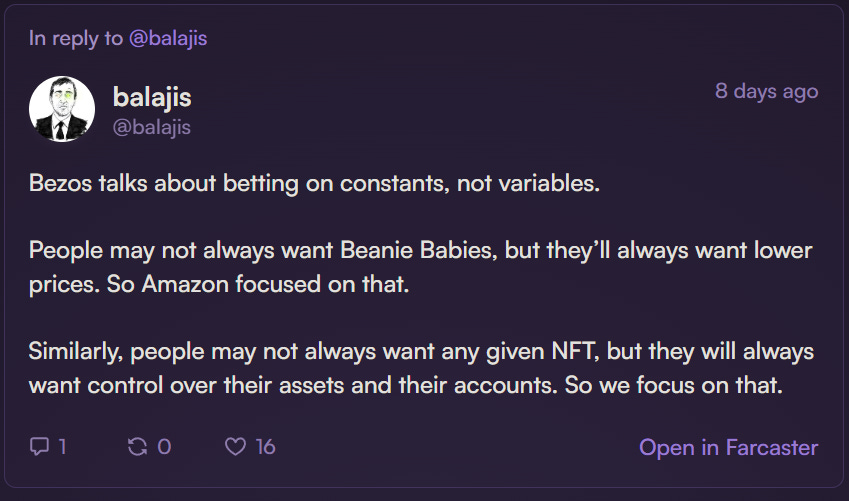Some Of The Things #6
Where I share some of the things I've been doing, thinking, and learning about across work, crypto, AI, wellness and other cool things on the internet.
Work Stuff
Last week I officially announced my new venture, Tenger Ways, a technology consulting firm for the modern age. We take a people-first approach to solving technology problems, using modern engineering practices based on Lean, DevOps and agile ways of working, to optimize any organization’s internal technology systems. You can read more about my reason for starting the company in the official launch announcement. If you’re inclined to help out, here are some links you can re-post on social media or share with your friends: linkedin or twitter announcements, company website or blog.
Cool Tech
Explore the Tibetan Buddhist Shrine Room at the Smithsonian National Museum of Asian Art. SOUND ON! 🔊
Ark Invest Big Ideas - for some insight into various emerging technologies.
As ChatGPT continues to take over the world, I’ve been thinking a lot about what happens to society when AI kills all our jobs and our economy shifts even more from labor to capital. I oscillate between extreme excitement and fear. I stumbled onto an article written about this very topic, except it was published in 1878(!!!), almost 150 years ago: The Relations of Labor and Capital from The Atlantic. It’s a fascinating glimpse into how people thought about how technology would impact jobs in the late 1800s in farming, textiles, transportation and more, how society should prepare (notably by stressing the importance of educating the masses - YES!! Is this in our discourse today?), and a discussion on communism, cooperative, competitive systems and equity. (I tweeted a few excerpts I found particularly amusing)
And a more modern take on the relations between labor and capital by Open AI CEO Sam Altman: Moores Law for Everything.
ChatGPT is going to make everyone mediocre!! BOOO!!! 👎👎👎 This seems to be the stance everyone has taken about how AI will change our world. But my friend Cameron Armstrong offered a different, more positive, take on mediocrity: we can become insta-mid at something completely new! Think about that for a moment. Everyone being mediocre at more things faster is a total level up for humanity. Sure, mediocre isn’t expertise, but it’s surely better than novice. Imagine being able to try out many more paths before deciding what to specialize in. 25 years ago, when I had to choose my college major, I had very little practical information when deciding which engineering discipline to choose. I chose Environmental Engineering and only decided in my junior year once I got a real-world internship it wasn’t for me. Luckily, I was able to pivot without too much trouble, but imagine getting instant knowledge about dozens of obscure subjects before deciding what path to take.
Balajis recently posted something that got me thinking about why I haven’t lost any of my enthusiasm for crypto and web3. What fundamental beliefs got me interested in crypto in the first place, and are they constant?
Information wants to be free. The internet doesn’t natively respect arbitrary country boundaries. I communicate and operate globally thru the internet, we need a native way to exchange value in the digital world.
Crypto is global. Reducing global wealth inequality and improving conditions globally is a good thing for humanity.
Digital transformation improved everything except money? 🤨Come on. Fintech is a given and blockchain (or distributed ledger technology as MIT Sloan dubbed it) is a natural extension.
Digital property rights/ better for creatives. What changed my mind early on was seeing my 10 year old son play video games - he and his friends were spending real money to customize their avatars? Real money!? It didn’t matter if I thought it was stupid, it was REAL to them. And then when I got my first PFP NFT and spent more and more of my time in the digital world, I started to understand the concept in a more intuitive way.
Wellness
Breathwork: I joined a community breathwork session hosted by Matthew. Our coach described breathwork as a remote control for your nervous system: learn to control your breath and you can use it to turn yourself up and down. We worked for about 45 minutes, progressing through 4 series of breath holds from 30 seconds to 60 seconds to 90 seconds and ultimately 120 seconds. I've done prana yama and kundalini and other meditations, but this session was based on Wim Hof method which I hadn’t done before. But the results were the same: a calm nervous system, a feeling of clarity, stillness and joy inside my being.
A note to, and about, my subscribers:
There are 12 of you now. Some of you are from my DevOps community, some from Farcaster (including the one person who encouraged me to start writing a substack), some are IRL friends, and there are a few I can only guess where you came from. But whether I know you through the weird wilds of web3, social media, or IRL, I feel a connection and I’m glad we’re on this journey of life together. I love hearing from you so please tell me what are some of the things you’re getting into? Leave a comment or connect on twitter or farcaster.
Thanks for subscribing and I hope you hang out for as long as the journey intrigues you and unsubscribe when it no longer does.
Until next time, keep putting good into the world. —adrienne🌏❤️





